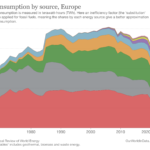Johannes Eber
This article was originally written for the “Good morning Europe” blog (www.goodmorningeurope.substack.com) by Johannes Eber. We were given permission to publish this article on the European Liberals for Reform blog.
These days, the Turkish Lira is a mess. This mess reminds us that there are good reasons why monetary policy should be largely beyond political influence.
Here are the reasons why politicians like to determine monetary policy:
- If a state is in high national debt, politics can reduce the debt problem by causing inflation. The higher the inflation, the lower the real debts. The past has shown that countries with high debt levels are prone to high inflation.
- The same applies to households. If many households are net debtors – meaning that they owe more money than is owed to them – then inflation will decrease the real burden of their debts. For this reason, too, the cause of inflation can be of interest to politicians.
- Politicians love a loose monetary policy. If central banks keep their key interest rates low, people and companies will borrow money cheaply. Subsequently, that easy money stimulates a short burst of economic growth, making people happy and ready to return incumbents to office.
- If there is already high inflation, politicians shy away from fighting inflation. Suppose the central bank raises the key interest rate to curb inflation. If borrowing money got more expensive, less money would be borrowed, and therefore less would be consumed and invested. The economy would be stalling then, jobs would be lost, and politicians would be coming under pressure.
- Politicians might also want to print money simply to avoid raising direct taxes or increasing national debt. Citizens pay for it anyway since inflation acts as a tax on cash balances (which lose value every day). Since this process is difficult to understand, politicians can blame the central bankers for the negative effects.
The annual inflation rate in Turkey rose up to 21.31 per cent last month – with the trend rising for months.
Turkish President Recep Tayyip Erdogan has a decisive influence on central bank policy in Turkey. He names the policymakers at CBRT (Central Bank of the Republic of Turkey).
It is easy to add up one and one to know who is responsible for the loss in value of the Turkish currency (Erdogan is not the only populist with that problem).
Erdogan’s latest action: A few weeks ago, he dismissed three central bank policymakers: deputy governors Semih Tumen, Ugur Namik Kucuk, plus Abdullah Yavas, the longest-serving member of the monetary policy committee. At least two of them opposed the last interest rate cut, clearing the way for more policy easing.
In just over two years, Erdogan has fired three bank governors. They couldn’t please the President.
They really couldn’t. No matter what they had done.
Because politicians’ short-term monetary policy wishes lead to long-term monetary problems. Low interest rates keep the economy going in the short run but lead to high inflation in the long run. So in Turkey, the country’s inflation rate “appears to be pushing Turkey past a tipping point,” as the New York Times wrote.
Most politicians do not suffer Erdogan’s fate. Because they weren’t in office long enough. But Erdogan has been in power for so long that he is beginning to experience the consequences of his politics. His influence on monetary policy has done well for him for a while; now his policy is catching up with him.
There is no easy way out, neither for Erdogan nor the people. They suffer from high inflation. To reduce it, Erdogan’s central bank has to raise interest rates. That will negatively affect economic development. On the other hand, if the CBRT lets inflation keep going, the Turkish Lira will lose its value. (And the Turkish people will lose their money.)
That serves Erdogan right, one could say. The satisfaction, though, will not help the Turks.
Author Profile

-
Founder of the "Good morning Europe blog" and Pixel economist
Guest author for European Liberals for Reform
Johannes' articles are originally written for the “Good morning Europe” blog (www.goodmorningeurope.org) and the Pixel economist (https://thepixeleconomist.substack.com).
We were given permission to publish his articles on the European Liberals for Reform blog.
Latest entries
Post Disclaimer
The opinions expressed by the author of this post do not necessarily represent the opinions and policies of ELfR.




